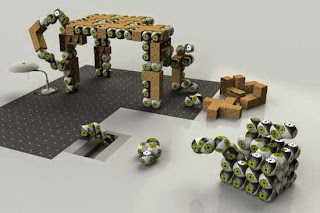
Brazilians protesting against hosting the World Cup in front of a stadium
With just over two weeks to the kickoff of the 2014 World Cup, host nation Brazil has been rocked by protests against the event, leaving analysts divided on the ability of the South American country to successfully prosecute the event, reports 'TANA AIYEJINA
never has a FIFA World Cup been rocked by protests, violence and deaths the way the 2014 edition billed for Brazil in the summer is turning out. This has led to doubts over the ability of the South American country to stage a successful tournament.
Brazil, five-time world champions, erupted into wild jubilations when they were awarded the hosting rights of the FIFA World Cup in 2007.
But with the country spending US$S11.7b in total on the World Cup and US$4b alone on 12 new and refurbished stadiums, demonstrators have vented their anger over the massive debt accumulated by World Cup construction works.
Signs that the citizens were unhappy over hosting the event at the expense of more important issues like education and health services began to manifest last year, during the Confederations Cup, a tournament used by FIFA to assess the hosts' readiness to stage the World Cup.
President Dilma Rousseff was jeered when she opened the Confederations Cup on June 15, 2013 but the protests over a hike in mass transit fares from $1.5 to $1.6 began days before the opening of the Confederations Cup.
More than one million Brazilians protesting against inflation, government corruption and state spending on World Cup stadiums took to the streets in Brazil's largest demonstrations in two decades.
The unrest rapidly spread to other cities with demonstrators focusing their anger not just on the transport fares but also on the $15b the government is allocating for the Confederations Cup and the World Cup.
The demonstrators want these resources earmarked instead for health care and quality education in a country with vast economic disparity between rich and poor.
Youths then clashed with police in Rio de Janeiro, as more than 200,000 people marched in major Brazilian cities like Porto Alegre, where the Eagles will clash with Argentina in their final Group F game on June 25, capital city Brasilia and Sao Paulo, to protest the billions of dollars spent on the Confederations Cup and high public transport costs.
At a point, there were rumuors that a certain amount of 2014 World Cup games could be moved to the United States as safety worries inside and outside of stadiums heightened.
FIFA president Sepp Blatter said afterwards that Brazil might have been the wrong choice as host of the World Cup if the tournament was affected by similar social protests as the Confederations Cup.
''If this happens again we have to question whether we made the wrong decision awarding the hosting rights,'' Blatter told German press agency DPA.
The protests continued again last week, with Pele, who led the country to three World Cup triumphs, criticising the organisation of the 2014 World Cup, saying billions have been spent unwisely.
Pele said on Monday he was in support of those protesting against the big spending, though he kicked against the violence.
At least six have died in connection with the protests while 14 workers died during the construction of stadiums.
Sydney Morning Herald quoted the 73-year-old as saying, "It's clear that politically speaking, the money spent to build the stadiums was a lot, and in some cases was more than it should have been.
"Some of this money could have been invested in schools, in hospitals…. Brazil needs it. That's clear. On that point, I agree (with the protests). But I lament what protesters are doing, which is breaking and burning everything. It's money that we will have to spend again."
He also criticised the late preparations of stadiums, and said the confusion was likely to keep tourists away.
"We already know that 25 per cent of foreigners who are going to Brazil (for the World Cup) are worried about this movement (protests), and I think they have even cancelled (their trip). So this is a great loss for the country," he said on Monday.
Pele was particularly critical of the stadium in Sao Paulo, the venue of the opening match between Brazil and Croatia on June 12.
Officials have admitted that a portion of the roof won't be completed until after the World Cup, which ends on July 13.
In fact, during the official test of the stadium last Sunday, only 40,000 tickets were put on sale for Corinthians' match against Figueirense because some of the 20,000 temporary seats needed for the World Cup opener were still being installed.
"It's a pity that we still have a stadium that's not yet finished,' he said.
"The first (World Cup) match is going to be in the Corinthians stadium in Sao Paulo, which is called Itaquerao, but there's a problem because it's not finished yet. That's what I say is regrettable. That's a problem."
Several other key infrastructure and stadiums are yet to be completed with the World Cup just few weeks away.
The latest protests have raised concerns about safety in Brazil. Drivers didn't work on Tuesday and Wednesday in Sao Paulo, with an estimated 230,000 commuters affected according to Reuters.
Police officers in at least 14 Brazilian states also went on strike Tuesday to demand better pay and working conditions.
Reports say the popularity of Rousseff has been dented by the upheavals.
Foreseeing turmoil before the World Cup commenced, the government formed a partnership with Condor Nonlethal Technologies, a Brazilian arms distributor, which also furnished the Turkish government with tear gas during Turkey's protests.
The Brazilian authorities have paid US$22m for over 75,000 units of non-lethal weapons, which would be used by the police during World Cup duration. These include 50,000 canisters of pepper spray and devices ranging from rubber bullets to smoke grenades.
Amidst all these protests, opinions have been divided over the ability of the football loving nation to stage a successful World Cup.
Sports broadcaster, Felix Okugbe, said the World Cup would hold as scheduled in the Latin American country but not without security problems.
"The protests cannot stop the World Cup from taking place but there will be serious security challenges during the duration of the tournament. A country that has too much poor people on the streets is a security risk on its own," Okugbe said.
"Brazil has been indebted to the International Monetary Fund for years and people are angry because the man on the street is not benefitting.
"Before last year's Confederations Cup, government brought buses and hiked the fare and we saw how lives were lost because of the protests that followed. People were dying during the Nigeria versus Uruguay match but FIFA said the match must go on."
Okugbe added that the inability of the government to curb crime in the favelas (slums) could have an adverse effect on visitors during the summer.
He said, "I was in Brazil in 1987 for a competition and before you leave the hotel, they will tell you to keep your jewellery safe before going to practice in the beach; they could cut off your hand just to get your hand chain.
"That is what you get when the poor outnumber the rich like you have in Brazil. The favelas are like ghettos where the drug dealers hold sway. The police cannot stop them. This can pose a risk to visitors during the World Cup."
Football analyst, Adeniran Ogunsanya (jnr), said the turmoil in Brazil was an internal issue, adding that Nigerians should concentrate on ensuring a successful World Cup outing for the Eagles.
He said, "We are yet to see how successful the tournament would be but I think there would be necessary arrangements to make it a success. What should concern us is how our team performs and not meddling in the internal problems of Brazil.
"The World Cup is an international event and once the tourists begin to arrive, security will be tight and they will be well protected. It's a domestic problem but the people are using the World Cup to show that citizens are not happy.
"I think they (protesters) should have said this when they were bidding for the World Cup. There may be violence in some areas but there will be adequate security in match venues and where foreigners will be."
Nigeria Football Federation vice-president, Mike Umeh, said, "I will not say that this is a very big challenge to them (Brazilians). I think the people should sit down and sort it out with their government."
Former Nigeria junior international, Jide Oguntuase, believes FIFA will cover up the lapses of the host nation.
"FIFA will not want to fail, so they will cover up Brazil's lapses. The time given for the completion of stadiums was not met yet FIFA didn't name new hosts. It means they want Brazil to host it," Oguntuase, a member of the Golden Eaglets squad at the 1989 U-17 World Cup, said.
"Where there is a high rate of poverty, there is bound to be security problems. They may not be guaranteed 80 per cent security because of the rate of the poor people. These poor people may want to even steal from visitors to the country during the competition."
____________________________________
From BEN Latest News: www.benlatestnews.com
Follow us on Twitter: www.twitter.com/benlatestnews


























